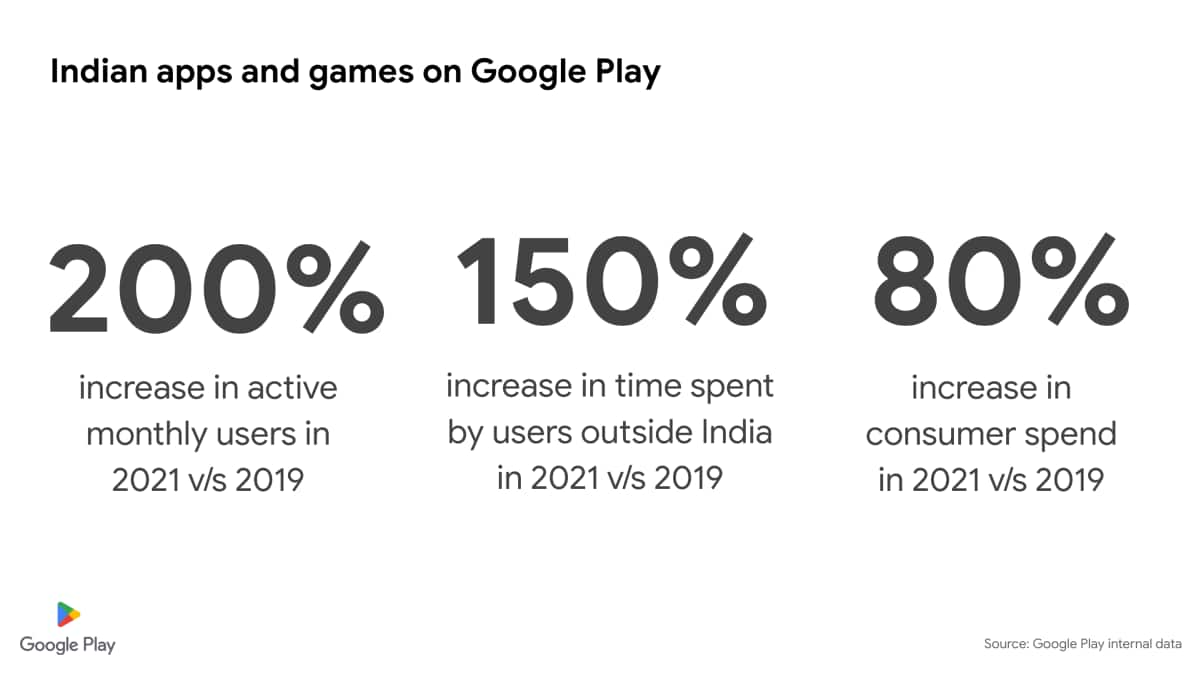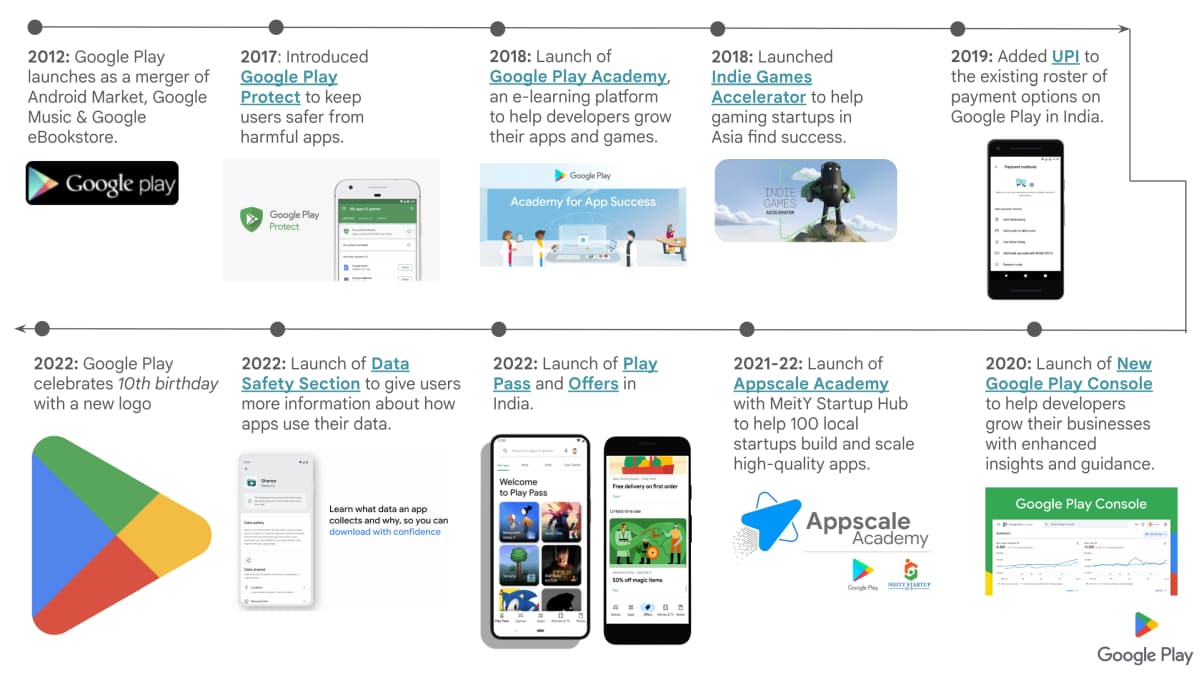



For years, India has been one of the biggest markets for Google Play in terms of app downloads and users.
Now, the country is also emerging as a key monetization opportunity, thanks to the rising adoption of digital transactions, particularly the Unified Payment Interface (UPI), a senior Google executive told Moneycontrol.
This development comes as the app marketplace, which brought together Android Market, Google Music, and Google eBookstore under one platform in 2012, completes 10 years.
"Growing monetization in India is a huge opportunity. The country has a very large user base which is opening up more and more to online transactions. And as that comes in, you are seeing the revenue momentum also grow significantly... Today, we're seeing a lot of products within our payment flow that will enable developers to be able to monetize better," said Aditya Swamy, Director, Play Partnerships, Google India.
For instance, allowing developers to segment the market and serve different offers to different users, and enabling the payment flows to be more seamless are among the opportunities to grow the monetization capability of developers in the country, he said.
Swamy said that Indian apps and games saw an 80 percent increase in consumer spends in 2021 compared to 2019 on Google Play, without disclosing more information on app spends.
The growth was partly driven by the introduction of UPI as a payment option on Google Play in India in 2019, in a bid to reduce online payment friction. Swamy said that bringing UPI into Google Play's payment flows has been a big area of investment.

'India will be a hub of global app innovation'
Another key fundamental shift Google sees is India's progression from a pure app consumption economy to an app development economy, and the country is on the fast track to becoming the number one nation in terms of where the developers are based, Swamy said.
"India is becoming a leading hub of global app innovation. I see a huge ambition for Indian developers to build for the world and how we can support them in truly becoming global developers is an important role that we can play," Swamy said. "India and other emerging markets will shape how we think about new emerging verticals."
Apps and games created by Indian companies saw a 150 percent increase in time spent by users outside the country in 2021 compared to 2019 on Google Play. Indian apps and games also saw a 200 percent jump in monthly active users on Google Play in 2021 compared to 2019, he said, without disclosing details.

Swamy said an important focus area for them has been nurturing and supporting a diverse range of app developers with various training and development programs to help them build high-quality apps.
In March 2022, Google and the Ministry of Electronics and IT's (MeitY's) Startup Hub unveiled the inaugural cohort of 100 Indian startups as part of Appscale Academy, a growth and development programme to train early to mid-stage startups across India.
These startups improved the UI, UX, security, user base, engagement rates and ratings of their apps as well as received various funding offers from venture capitalists as part of this programme, Swamy said.
The company's self-learning platform Play Academy provides developers with resources to build, publish, and scale mobile apps. Swamy said that Play Academy has trained more developers in India than any other country across the world, with over 80,000 local developers trained since its launch in 2018.
To enable app discovery, Swamy said they now have a large merchandising team that looks at localising the storefront with apps that "are most relevant to Indians" through curated app collections such as 'Made in India' apps, 'Rising Stars' (apps that are doing well from India) and themed collections for different occasions such as Independence Day, Holi, and Diwali among others.
"I think the whole storefront is becoming much more locally relevant and that enables discovery," he said. "If the store is made more relevant to the user, I think that's how you will bring more people into the store and get more developers as well."
Swamy cited an example of the new Offers tab on Google Play Store, that features offers to users on a daily basis from apps they have already downloaded on their phone.
Developer backlash
That said, Google Play has faced an intense backlash from Indian developers in the past couple of years over the mandatory integration of its Play billing system and is thereby enforcing a 15-30 percent service fee over app sales revenues.
This move has attracted a probe from the country's antitrust body Competition Commission of India, which is of the prima facie view that such a policy is unfair as it restricts the ability of app developers to select a payment processing system of their choice.
Google has since then extended the policy deadline only in the Indian market. App developers in the country now have to comply with the Play billing policy by October 31, 2022, while it has already been made mandatory in other markets.
Another concern that several app developers have raised over the years is Google Play's alleged poor developer support, wherein apps are taken down or accounts get terminated, sometimes without any prior warning or notice. Due to this, developers say they don't get to know what they did wrong or what they could do to mitigate potential issues.
Acknowledging the issue, Swamy said the majority of the issues developers face are due to a "lack of awareness", however they are trying to be more proactive about it.
"The fundamental reason why we are doing what we're doing is to keep users safe. A lot of apps will face problems, their app won't be updated, or they will be taken off from the store because user safety is being compromised. User safety is of top priority to us. That is the holy grail," he said.
Swamy said that the company is now trying to increase awareness through its Play Academy initiative and quarterly webinar series that decodes the company's policy announcements, share useful resources and answer any questions that developers may have.
Developers also have access to an India PolicyBytes video series to help them understand its policies better and equip themselves with best practices. There is also an escalation matrix to get further help, if needed, he said.
"A majority of issues will, however, get solved with scaled-up education on how to publish and keep users safe. That's what will enable us to reduce this challenge that the industry is facing, but this is something that we hear a lot, and we continue to invest in it and find ways to address the issue," Swamy said.

Discover the latest Business News, Sensex, and Nifty updates. Obtain Personal Finance insights, tax queries, and expert opinions on Moneycontrol or download the Moneycontrol App to stay updated!
Find the best of Al News in one place, specially curated for you every weekend.
Stay on top of the latest tech trends and biggest startup news.